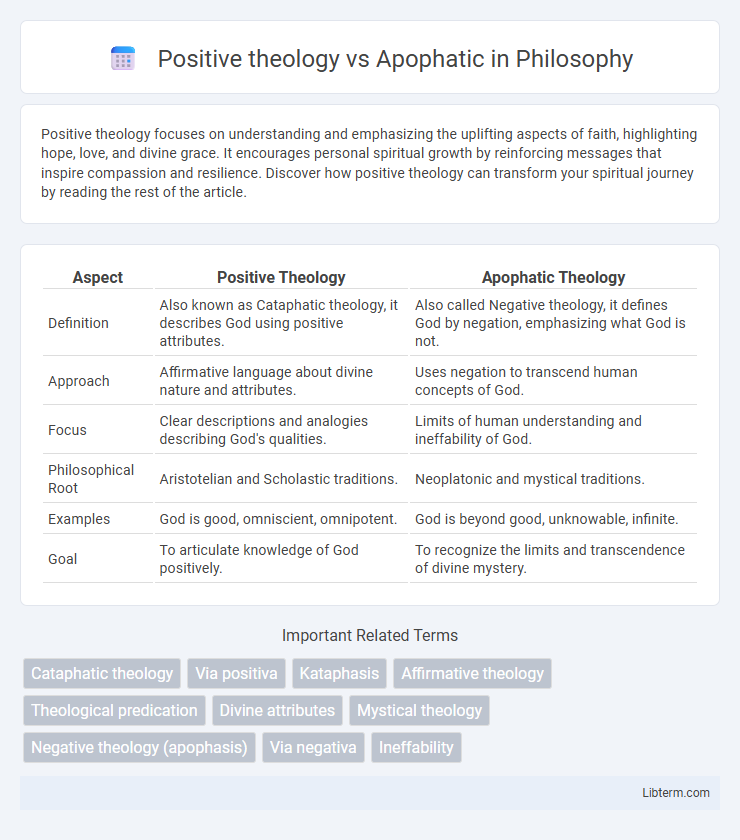Positive theology focuses on understanding and emphasizing the uplifting aspects of faith, highlighting hope, love, and divine grace. It encourages personal spiritual growth by reinforcing messages that inspire compassion and resilience. Discover how positive theology can transform your spiritual journey by reading the rest of the article.
Table of Comparison
| Aspect | Positive Theology | Apophatic Theology |
|---|---|---|
| Definition | Also known as Cataphatic theology, it describes God using positive attributes. | Also called Negative theology, it defines God by negation, emphasizing what God is not. |
| Approach | Affirmative language about divine nature and attributes. | Uses negation to transcend human concepts of God. |
| Focus | Clear descriptions and analogies describing God's qualities. | Limits of human understanding and ineffability of God. |
| Philosophical Root | Aristotelian and Scholastic traditions. | Neoplatonic and mystical traditions. |
| Examples | God is good, omniscient, omnipotent. | God is beyond good, unknowable, infinite. |
| Goal | To articulate knowledge of God positively. | To recognize the limits and transcendence of divine mystery. |
Introduction to Positive and Apophatic Theology
Positive theology emphasizes affirming clear, descriptive statements about the nature and attributes of the divine, relying on revelation and doctrinal teachings to articulate God's essence. Apophatic theology, also known as negative theology, highlights the limitations of human language in describing God, asserting that the divine can only be understood through what cannot be said or by negating all finite attributes. Together, these approaches provide complementary frameworks for exploring theological truths, balancing affirmative knowledge with the mystery and transcendence of the divine.
Defining Positive (Cataphatic) Theology
Positive theology, also known as Cataphatic theology, defines God through affirmations and descriptive language, emphasizing what can be positively stated about the divine nature using scripture, tradition, and reason. It seeks to convey God's attributes such as omnipotence, benevolence, and omniscience, allowing believers to form a conceptual understanding of the divine. In contrast, Apophatic theology highlights the limitations of human language, focusing on what cannot be said about God, emphasizing divine mystery and transcendence.
Understanding Apophatic (Negative) Theology
Apophatic theology, also known as negative theology, emphasizes understanding God through negation by asserting what cannot be said about the divine nature, highlighting the limitations of human language and concepts. In contrast to positive theology, which makes affirmative statements about God's attributes, Apophatic theology promotes an experiential approach that recognizes the mystery and ineffability of the divine essence. This approach encourages believers to transcend intellectual knowledge, fostering a deeper spiritual union through silence and contemplation.
Historical Roots and Development
Positive theology, rooted in early Christian tradition, emphasizes affirmative doctrines derived from Scripture and Church teachings, tracing its development through figures like Thomas Aquinas who systematized theological knowledge via scholastic methods. Apophatic theology, originating in Eastern Orthodox thought with early Church Fathers such as Gregory of Nyssa and Pseudo-Dionysius, focuses on describing God through negation, highlighting divine incomprehensibility and transcending human language. The historical divergence between these approaches reflects contrasting epistemological views on divine knowledge: cataphatic theology relies on positive assertions, whereas apophatic offers a mystical, negative theology that shaped Eastern and Western theological discourse.
Key Figures in Both Theological Traditions
Key figures in positive theology include Thomas Aquinas and Anselm of Canterbury, who emphasized affirming God's attributes through reason and revelation. In contrast, apophatic theology is shaped by thinkers like Pseudo-Dionysius the Areopagite and Gregory of Nyssa, who highlighted the ineffability of God by describing what God is not. Both traditions significantly influence Christian theological discourse, with positive theology focusing on divine affirmation and apophatic theology on divine negation.
Philosophical Foundations: Saying vs. Unsaying God
Positive theology affirms God's nature by using descriptive language and doctrinal affirmations, rooted in philosophical realism that emphasizes knowing God through attributes and divine revelation. Apophatic theology relies on negation, expressing the ineffability of God by stating what God is not, embodying a philosophical stance that prioritizes the limits of human language and transcends conceptual definitions. The tension between saying and unsaying God reflects two fundamental epistemological approaches: one seeks knowledge through positive articulation, while the other embraces mystery through deliberate silence and negation.
Scriptural Support and Interpretations
Positive theology, or cataphatic theology, emphasizes describing God through affirmations based on Scripture such as God's nature revealed in Exodus 34:6-7 and John 1:14, portraying God's attributes affirmatively. Apophatic theology, conversely, highlights the ineffability of God, relying on scriptural passages like Isaiah 55:8-9 and 1 Timothy 6:16 to underscore God's transcendent mystery beyond human comprehension. These interpretations influence theological discourse by balancing God's knowable characteristics with divine incomprehensibility grounded in biblical evidence.
Strengths of Positive Theology
Positive theology centers on affirming specific attributes and doctrines of the divine, offering clear and concrete understandings that enhance faith and comprehension. Its strength lies in providing definitive knowledge about God through affirmations, enabling believers to build a structured and systematic theology. This approach supports doctrinal clarity and fosters theological education by articulating what God is, rather than what God is not.
Strengths of Apophatic Theology
Apophatic theology excels in emphasizing the transcendence and ineffability of the Divine, providing a robust framework that acknowledges the limitations of human language and concepts in describing God. By focusing on what God is not, it avoids anthropomorphic projections and fosters a deep sense of mystery and reverence essential for spiritual humility. This theological approach encourages contemplative practice and mystical experience, offering strengths in navigating the complexity of divine mysteries beyond rational comprehension.
Integrating Positive and Apophatic Approaches
Integrating Positive and Apophatic Theology enriches spiritual understanding by balancing affirmations about God's nature with recognition of divine mystery beyond human comprehension. Positive theology employs clear doctrinal statements and affirmations, while Apophatic theology emphasizes God's ineffability through negation and silence. This synthesis fosters a holistic approach, allowing believers to articulate faith confidently while embracing the transcendence that defies full conceptual grasp.
Positive theology Infographic

 libterm.com
libterm.com